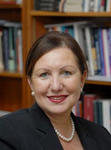Seyla Benhabib
Eugene Meyer Professor of Political Science and Philosophy
 Seyla Benhabib, B.A. American College for Girls, Istanbul, and second B.A. Brandeis University, Ph.D. Yale University, faculty member at Yale since 2000: In 2004, you remarked in an interview, “I think most people who do philosophy … have a certain central question, an existential question that accompanies them most of their lives. You write different works, you write different books, but I believe that you are basically asking the same question.”
Seyla Benhabib, B.A. American College for Girls, Istanbul, and second B.A. Brandeis University, Ph.D. Yale University, faculty member at Yale since 2000: In 2004, you remarked in an interview, “I think most people who do philosophy … have a certain central question, an existential question that accompanies them most of their lives. You write different works, you write different books, but I believe that you are basically asking the same question.”
Your question—“how to reconcile universalistic principles of human rights, autonomy, and freedom with our concrete particular identity as members of certain human communities divided by language, by ethnicity, by religion”—seems as capacious as it is profound. Whether in more philosophical works such as Critique, Norm, and Utopia and Exile, Statelessness, and Migration, or in concrete application to issues concerning migration, gender, and global justice as in Another Cosmopolitanism, your contributions have had a decisive impact on contemporary critical theory, legal theory, feminist theory, Jewish political thought, and the always-evolving jurisprudence of human rights.
Your own cosmopolitanism has informed your path. Born in Istanbul into a Sephardic Jewish community whose ancestors had left Spain for the Ottoman Empire in the fifteenth century, raised in the twentieth-century Turkish republic, you arrived first at Brandeis, then at Yale in the 1970s and then made your mark on other prestigious institutions as fellow, and faculty member, before returning to Yale at the start of the new millennium. Your work addresses issues of central importance in the United States, but it also elevates and edifies the voices of scholars around the world. Your contributions to global critical theory have earned you accolades worldwide, including the Ernst Bloch Prize for contributions to cultural dialogue, the Leopold Lucas Prize of the Evangelical Academy of Tübingen, the Meister Eckhart Prize of the Identity Foundation and the University of Cologne, and honorary degrees from the Humanistic University in Utrecht, the University of Valencia, and Bog˘aziçi University in Istanbul.
In the course of your storied career, you have graciously lent your expertise and generosity to many students who have gone on to have remarkable careers of their own. You have supervised dissertations that span the canon of political theory from multiple perspectives. Students see you as a sharp, committed, critical reader who fights for the rights of young scholars to undertake ambitious research projects, especially those that challenge the demands of speed and marketability that the academic world seems increasingly to impose.
You are a strong, articulate presence at Yale as well as in the larger world, a founder of the Women Faculty Forum here, and a vigorous advocate in faculty deliberations about the University’s direction. When you rise to speak, people know that they will hear powerfully argued and beautifully iterated views, and woe be to them if they dissent and cannot counter with equal suasion. As you retire from Yale, your proud alma mater thanks you for the distinction that you have brought to the study of political theory at Yale, to its practice as a vocation in the world, and for all of your exemplary contributions.